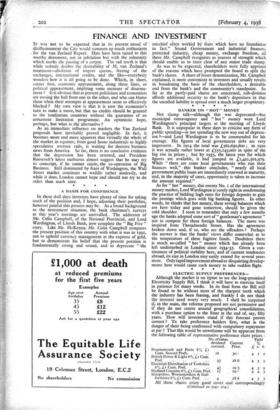BANKER ON " HOT " MONEY
Not slump talk—although this was deprecated—but municipal extravagance and " hot " money were Lord Wardimgton's principal targets at the meeting of Lloyds Bank. It is unpopular in these days to criticise any form of public spending—is not spending the new way out of depress- ion ?—and Lord Wardington is to be commended for his courage. His figures of local government debt are very impressive. In 1914 the total was £562,630,600; in 1920 it was actually rather lower at £555,145,000 in spite of the big rise in prices ; but by 1935, the latest year for which figures are available, it had jumped to £1,421,501,979. While "there are some local governments who run their finances well," this banker concludes, "nearly all local government public loans are immediately renewed at maturity, and, in the majority of cases, opportunity is taken to increase the amount required."
As for" hot" money, this enemy No. I of the international money market, Lord Wardington is surely right in condemning the practice of bidding high rates for foreign deposits to gain the prestige which goes with big banking figures. In other words, he thinks that hot money, these roving balances which are here today and gone tomorrow, should be given the cold shoulder. I seem to remember that only a few months ago the banks adopted some sort of" gentleman's agreement" not to compete for these foreign balances. The move was inspired from Threadneedle Street. Has the agreement broken down and, if so, who are the offenders ? Perhaps the answer is that the banks' views differ somewhat as to the temperature of these fugitive funds. Doubtless there is much so-called " hot " money which has already been left undisturbed in London since 1934-35. Given a con- tinuance of political stability here, and of current tendencies abroad, its stay in London may easily extend for several years more. Only rapid improvement abroad or disquieting develop- ments here would cause such money to take sudden flight. * * * *














































 Previous page
Previous page